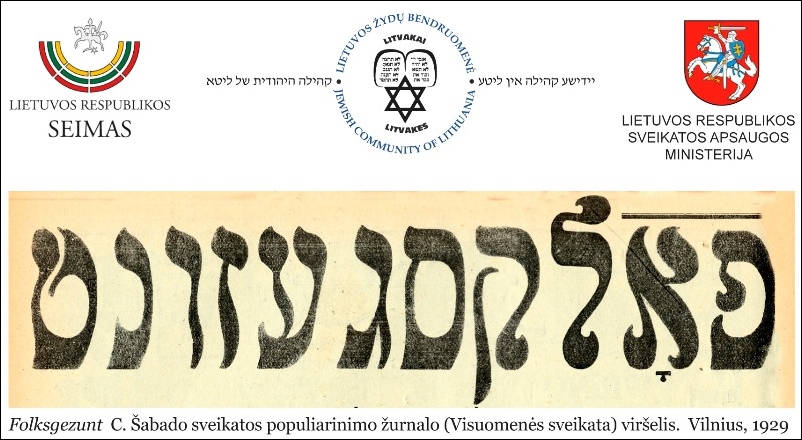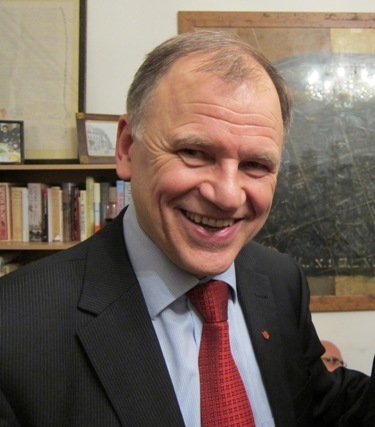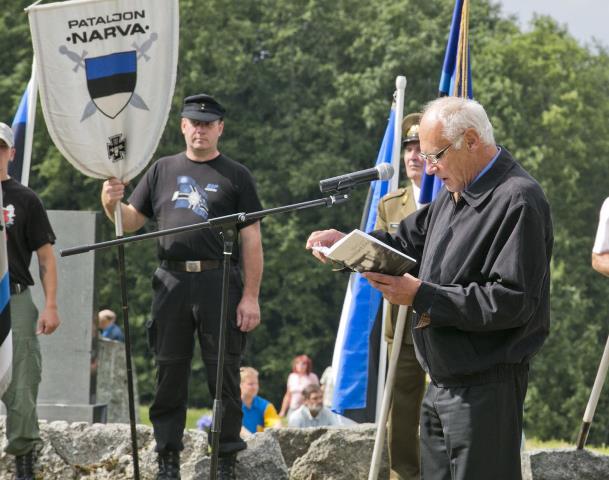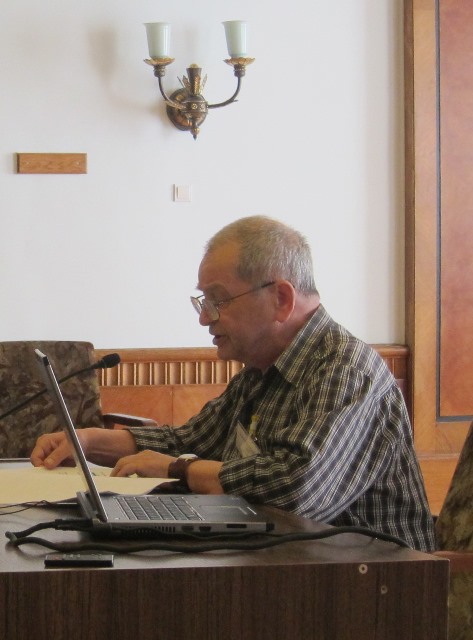Debate in Jerusalem, at World Forum for Combating Antisemitism, at Session on Holocaust Denial and Distortion in Eastern Europe
◊
◊
◊
On November 17, 2013 I was invited and participated as a guest speaker at the Yizkor memorial event organized by the “Jewish Survivors of Latvia, Inc.” (New York). The event was held at the Park East Synagogue at 163 East 67th Street in Manhattan.
The really important speech, though, was given by Douglas Davidson, the US Special Envoy for Holocaust Issues. He dealt with the results of his numerous visits to Latvia pertaining to that specific issue: due restitution to the Jewish victims or their heirs. Their properties were stolen or requisitioned during the war and the massacres.
Text of the Resolution
◊
Dear Dr. Rogatchi,
Warm congratulations on your excellent film, The Lessons of Survival. Conversations with Simon Wiesenthal. We encourage all our readers to see the film, and those who live in or near Vilnius to attend the screening this Tuesday 28 October 2014 at 5 PM at the Vilnius Jewish Public Library, followed by a distinguished panel discussion.
◊
Asuccessful, highly compressed one-day conference, exhibition and city plaque unveiling were all shoehorned into one day, today, in Vilnius, the Lithuanian capital, to mark the 150th birth year of the celebrated and beloved Dr. Tsemakh Shabad (1864–1935), Vilna physician, public health advocate, benefactor, Yiddishist theoretician and builder of Yiddish educational infrastructure from elementary schools to the university-level Yivo institute. He was also a representative in the city’s municipality. Shabad was a legend in his own time. When poor sick children in any shtetl of Vilna province, of whatever nationality or background, were in danger of imminent death from disease, there were no greater words of relief than “Dr. Shabad is on the way.”

The conference banner, a joint production of the Lithuanian parliament (Seimas), the Jewish Community of Lithuania and the Ministry of Health, featured the Yiddish Folks-gezunt (public health) logo, beloved of Dr. Shabad.
Nobody could love or respect the Yivo Institute for Jewish Research more than I do. It was founded as the Yiddish Scientific Institute in Vilna, Poland (now Vilnius, Lithuania) in 1925. Yivo remains a symbol for all who cherish our Yiddish heritage and, now, its last prewar survivors. Through the years I have spent many wondrous hours at Yivo, digging, discovering, and learning about my Litvak ancestors, their shtetlakh, and their culture. Being there always felt like being home. The books and documents I handled seemed almost sacred. Memories of conversations with Yivo’s’s revered librarian Dina Abramowicz still make me smile. . .
Dr. Efraim Zuroff, Holocaust historian, Nazi-hunter, and director of the Simon Wiesenthal Center’s Israel office, has posted the following comment on the website of Tablet magazine, as one of the comments to a new book review. The comment also appears separately on Facebook.
The UK’s home secretary Theresa May, the Hungarian Jobbik party, and Holocaust Memorial Day have all been in the press lately. Reading how the leader of pro-Nazi Jobbik party was, in the interests of free speech, allowed to hold his rally in Hyde Park, I have to question why Ms. May allowed this man entry into the UK and hadn’t called his racist attitudes, “unacceptable” as she had in the past with, “Every Muslim should be a terrorist” Zakir Naik. What had changed?
The Hungarian government, like others in Eastern Europe, is enlisting well-intentioned Western naifs in its plans to mobilize Holocaust commemoration itself as part of the East European revisionist Double Genocide movement. The effort seeks to downgrade the Holocaust, downplay local collaboration and participation, and to cover tracks with sophisticated revisionism. Along the way, memberships in august bodies, prizes, awards and junkets are generously offered to select foreigners. The efforts by the Lithuanian government have been in the forefront of the tendency.
And the Lord God said unto the woman, What is this that thou hast done? And the woman said, The serpent beguiled me, and I did eat. Genesis 3:13
And he said, What hast thou done? the voice of thy brother’s blood crieth unto me from the ground. Genesis 4:10
Driving east out of Rokiškis, fields give way to forest, and the lake country leads on to strange and wild hills in an abandoned quarter of the country bordering Latvia. The lake country is beautiful, almost alpine in its effect, and spotted with small settlements and villages of varying sizes, some even boasting gas stations and schools.
Readers on several continents again report to Defending History that the Jerusalem Post has failed to post perfectly polite comments to yet another ecstatic ode to issueless Lithuanian-Jewish love. This time it’s the story “Growing Lithuanian Business Ties Beget Political Support” which reported on the recent visit to Israel of the Lithuanian Minister for the Economy Evaldas Gustas.
The rejected comments pointed out that a senior specialist employed at his ministry was exposed last spring as Lithuania’s most hateful internet blogger, responsible for a series of images disparaging to Jews, Blacks, Gays, and to the history of the Holocaust in Lithuania (sampling of images here). Our Open Letter to the minister essentially asks why the hateful top official is still in office. Is such a question taboo for a major English language daily in Israel?
This op-ed was first published in Jerusalem Report in August 2013.
I remember my first visit to Yad Vashem as a 16-year-old visitor to Jerusalem. It had a profound, and indeed formative, effect on me. I left there with a badge clipped to my lapel inscribed with the motto, zakhor, the Hebrew word for remember.
It is gratifying that numerous scholars from different parts of the world, and indeed of differing opinions on the contentious issues that lie at the heart of Defending History, have on occasion found it a useful resource for data and views on various topics, including the Double Genocide movement, the Prague Declaration (2008), the Seventy Years Declaration (2012), the politics of memory, Holocaust Obfuscation, glorification of Holocaust perpetrators (and attempted criminalization of resistance heroes), East European antisemitism, racism, homophobia, and Litvak identity theft (more on contents and quick intro page).
See also: Andriukaitis’s 2012 reply to the foreign minister; on the floor of parliament; Andriukaitis section

Vytenis Povilas Andrukaitis, health minister of Lithuania. Photo: DefendingHistory.com
Vytenis Andriukaitis is a veteran politician. If you haven’t been following Lithuanian politics since 1990, there’s a good chance you’ve never heard of him, and even if you have, there’s a fair chance you didn’t notice him amid the various cults of personality which have dominated the political scene since about 1990.
The reason for that is fairly simple: Andriukaitis has never cultivated or even tolerated a cult of personality to grow up around him. From the very first days of Lithuanian independence, a freedom movement with which Andriukaitis was intimately involved, he has stubbornly clung to the idea of multiparty parliamentary democracy, largely by his own tenacity reviving the pre-World War II Lithuanian Social Democratic Party.
This year’s summer celebration of Estonia’s Hitler-allied Waffen SS was held as scheduled, in the Sinimae hills of eastern Estonia last Saturday, the 27th of July. Images and reports were carried by Postimees and other media.

Source: Postimees
NOTE: This was written in response to “Foreign countries use far-right operations to undermine Lithuania’s image” published on June 7, 2013, on the Lithuania Tribune website.
Initially the editor-in-chief of the Lithuania Tribune agreed to publish the following reply in the Lithuania Tribune, but then changed his mind and finally refused, only informing the author a month later…
See also:
Page on the commission
Critiques of the commission and its associated Prague Declaration
DH section on the commission.
Resignations to date from Commission-related bodies include Dr. Yitzhak Arad, Sir Martin Gilbert (London), Prof. Gershon Greenberg (Washington DC), Prof. Konrad Kwiet (Sydney) and Prof. Dov Levin (Jerusalem).

Milan Chersonski reads his paper at the Riga conference, 27 May 2013
The following is the authorized English version of the paper read by Milan Chersonski in Riga on 27 May 2013 at the Second International Conference on Holocaust Museums and Memorial Places in Post-Communist Countries.
Milan Chersonski (Chersonskij), longtime editor (1999-2011) of Jerusalem of Lithuania, quadrilingual (English-Lithuanian-Russian-Yiddish) newspaper of the Jewish Community of Lithuania, was previously (1979-1999) director of the Yiddish Folk Theater of Lithuania, which in Soviet times was the USSR’s only Yiddish amateur theater company.
See also the Milan Chersonski section of Defending History.
In Eastern European countries occupied by Nazi Germany during World War II there was a phenomenon called “collaborationism”: the cooperation of individuals and organizations with the Nazi occupation regime. In the modern historiography of these countries, events of that fateful time are often presented not by historians, but primarily by right-wing or extreme right-wing politicians, who continue today to convince the public that the collaboration was in fact nothing but a form of struggle for independence, and a kind of resistance to the Nazi regime.
Sometimes this approach to the evaluation of historical events is called whitewashing. The purpose of this manipulative activity is clear: to absolve the erstwhile Nazi collaborators and pro-Nazi national organizations from the responsibility for the crimes against humanity committed during the Nazi occupation, and their countries from responsibility for Nazi crimes.